By David Bandurski — The murder in Beijing on Saturday of American Todd Bachman, the father-in-law of U.S. men’s volleyball coach Hugh McCutcheon, was a major story, particularly coming as it did at the end of the first day of Olympic competition. But while Chinese Web users had a reasonably good chance of running across the story, newspaper readers might have missed it altogether.
The morning after the attack, the brief Xinhua News Agency release on the story was available under the domestic news section of the main news page at QQ.com, one of China’s top Web portals.
The QQ headline clearly linked the murder to the U.S. Olympic team: “Relative of U.S. Men’s Volleyball Team Murdered at Drum Tower.”

[Screenshot of news page at QQ.com, August 10, 2008, 9am, article on murder circled in red.]
In China’s official party mouthpiece, People’s Daily, it was a very different story. As expected, the dominating meta-story was the Beijing Olympic Games as an unprecedentedly positive historical, political and sporting event.
Media have certainly been instructed to “emphasize positive news” during this key moment for China. And there is the further issue — pressure from propaganda authorities aside — of news choice among Chinese editors, who are likely avoid more unpleasant stories that seem to dampen the positive public mood surrounding the Games in Beijing.
The latter is of course partly a commercial choice, and also, no doubt for some editors, a personal inclination.
For the People’s Daily, the reason for de-emphasizing the Bachman story is clear — it damages the purely positive image China is trying to project for the Games. The story is therefore pushed to the very back of the paper, to page 19, the last page of news. Again, it is the official Xinhua release.
Why run the story at all? To demonstrate, of course, that China does not regard the incident as totally inconsequential.
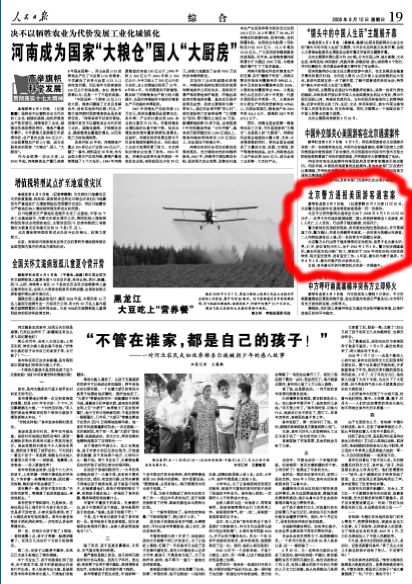
[Above: Page 19 of the August 10 edition of People’s Daily, story of Bachman’s murder circled in red.]
How did commercial newspapers play the story?
Beijing Times, the commercial spin-off of the official People’s Daily, gave the story no front page coverage. But the paper did play it on page 10 with a slightly larger headline, right below a story about how train tickets in Beijing can now be purchased five days in advance, and right above a human interest story about a Chinese AIDS orphan visiting the capital to attend the Games.
The headline for the Beijing Times story, again the official Xinhua release, emphasized China’s diplomacy and made no reference to the U.S. Olympic team: “China’s Ministry of Foreign Affairs Gives Top Priority to Murder of American Tourist.”
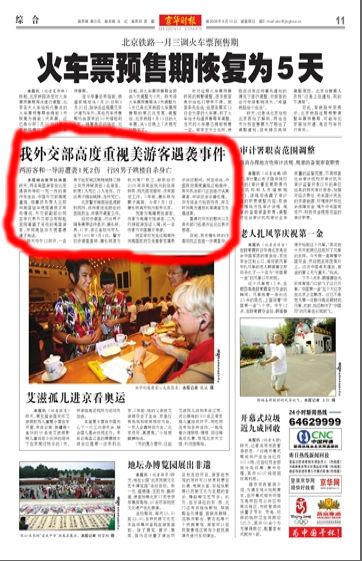
[Above: Page 11 of the August 10 edition of Beijing Times, with the murder story circled in red.]
In perhaps the best indication of the pressure coming down from the top for “positive news,” and of the potential risk involved for national newspapers that might consider running the Bachman murder story more prominently, Southern Metropolis Daily, one of the country’s leading commercial newspapers, gave the story no front page attention.
Southern Metropolis Daily buried the story on page 16, deep inside its rosy Olympics coverage. The headline similarly made no mention of the murder’s connection to the U.S. Olympic team, focusing instead on the actions of police: “Beijing Police Issue Release on Murder of American Tourist.”
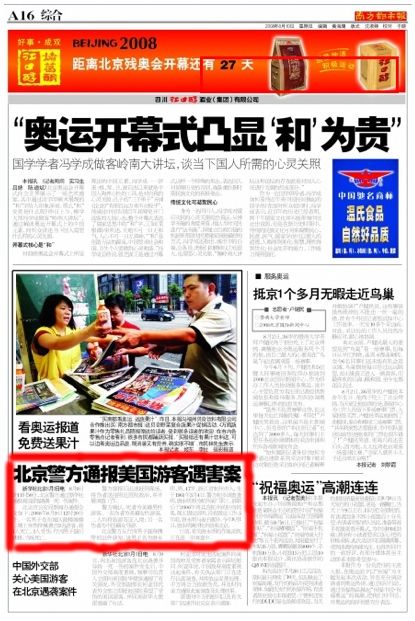
[Above: Page 16 of the August 10 edition of Guangdong’s Southern Metropolis Daily, with murder story circled in red.]
So, did any of the ten or so mainland Chinese newspapers to run the Bachman murder story on August 10 give it relatively prominent play?
Yes, in fact. Just one.
Xi’an Daily, the official party newspaper of the city of Xi’an, ran the Bachman story at the bottom right-hand corner of the front page. The tiny headline was identical to that of Southern Metropolis Daily, focusing on the actions of police.
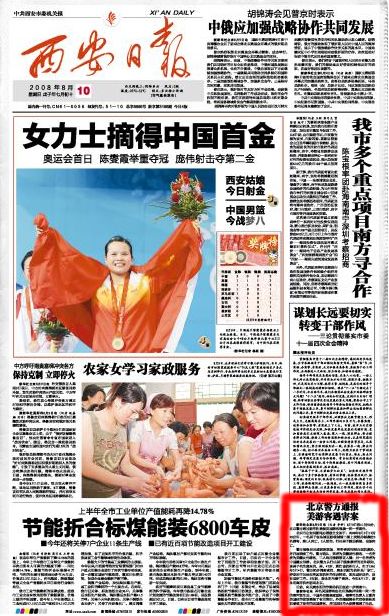
[Above: Front page of the August 10 edition of the official Xi’an Daily, with story on Bachman murder circled in red.]
In fact, if we were to offer awards for guts in the placement of the Bachman story in China, they would all go to party newspapers. Commercial papers, stuck between the official priority of “positive news” and the need to please readers with the right kind of Olympics coverage, were in no position to push.
The following is from the August 10 edition of the official Zhejiang Daily, which played the Bachman story on page 2.
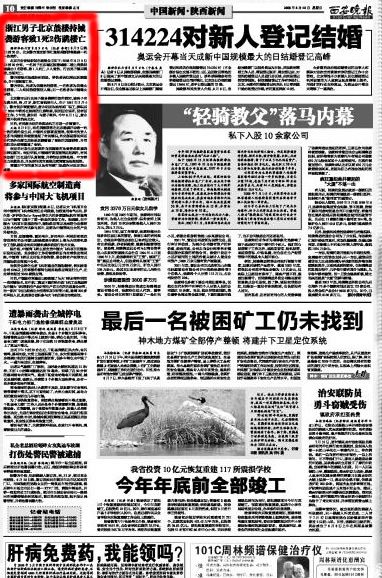
[Above: Page 2 of August 10 edition of Zhejiang Daily, with murder story coverage circled in red.]
Zhejiang Daily‘s placement of the story was perhaps extra gutsy considering that Tang Yongming (唐永明), the man responsible for the murder of Todd Bachman, was one of the province’s own, a laid-off factory worker from Hangzhou.
The headline read: “Zhejiang Man Kills One Tourist and Injures Two in Attack at Beijing’s Drum Tower.”
FURTHER READING:
“The Chinese Censorship Foreigners Don’t See,” Rebecca MacKinnon for The Wall Street Journal, August 14, 2008
“Beijing Olympics: Chinese Tanks Watch Over Media Centre,” The Telegraph, August 12, 2008
[NOTE: Richard Spencer mentions an order concerning the Bachman story, and calls it “unusually specific.” In fact, the text of this order (The Telegraph claims to have obtained a list of these orders) sounds very much like what we have seen of such orders, including specific instructions for media to use only Xinhua news or avoid a particular story altogether. It sounds like the newspaper got its hands on a page of routine orders given to various media from the propaganda department and giving instructions on coverage.]
“China’s Media Censored Over Stabbing,” The Age, August 12, 2008
“Unlike Athletes, China’s Media Held to Different Standards During Olympics,” OpenNet Initiative, August 12, 2008
[Posted by David Bandurski, August 12, 2008, 4:37pm HK]




















